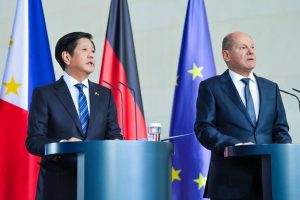Philippine President Ferdinand Marcos Jr. is set to meet with U.S. Secretary of State Antony Blinken next week to discuss cooperation and security matters amid continuing tensions in the South China Sea.
In a statement issued last night, Marcos’ office said that the meeting would discuss the strengthening of defense and economic ties between the U.S., the Philippines, and Japan – three nations with shared concerns about China’s expansive maritime claims.
The Inquirer quoted Foreign Secretary Enrique Manalo as saying that Blinken would arrive in Manila on the evening of March 18 before paying a visit to Marcos the following day.
The meeting will almost certainly discuss the growing frequency and intensity of Chinese incursions into areas of the South China Sea claimed by the Philippines. These have resulted in a series of dangerous high-seas encounters, including, most recently, the China Coast Guard (CCG)’s ramming of a Philippine Coast Guard vessel. The incident also saw the CCG fire water cannons at one of the supply vessels, smashing its windshield and injuring four navy personnel. Like many recent incidents, this confrontation took place close to Second Thomas Shoal, a Philippine-occupied feature in the South China Sea.
Speaking yesterday in Berlin, where he was on a three-day state visit, Marcos said that the intention of the meeting “is to continue the plan to strengthen the cooperation between the three countries – the United States, Japan, and the Philippines.” Both Washington and Tokyo have deepened their defense cooperation with the Philippines since Marcos took office in mid-2022, holding joint maritime patrols and, in the case of the U.S., negotiating access to an expanded roster of Philippine military facilities under the 2014 Enhanced Defense Cooperation Agreement. Japan’s government has yet to confirm its involvement in next week’s meeting.
Earlier, at a joint briefing with German Chancellor Olaf Scholz, Marcos said that it was “difficult to see a way forward” on the maritime and territorial disputes in the South China Sea, given that China is arguing from entirely different premises from the Philippines.
“We have not rejected any proposals that China has made to us but the premise is something that we questioned… that premise that China has made is that their territory follows what is now described as a 10 dash line,” Marcos said.
Marcos’ statement was an apparent reference to a statement issued by the Philippines’ Department of Foreign Affairs (DFA) on Tuesday, in response to a Chinese official’s claim that Manila had “ignored” Chinese attempts to resolve the disagreements. The DFA confirmed that it had received several “maritime-related proposals” from China, but that they could not be considered because they were against Philippine national interests.
Among the latest proposals was one in which Beijing “insisted on actions that would be deemed as acquiescence or recognition of China’s control and administration over the Ayungin Shoal,” Manila’s name for Second Thomas Shoal. The DFA said that the Philippines could not consider such a proposal “without violating the constitution or international law.”
“While a few proposals were deemed somewhat workable, many of the remaining Chinese proposals were determined, after careful study, scrutiny and deliberation within the Philippine Government, to be contrary to our national interests,” the statement added.
During his meeting with Marcos, Scholz assured him of Germany’s continued support on the South China Sea and his commitment to increase maritime cooperation.

































